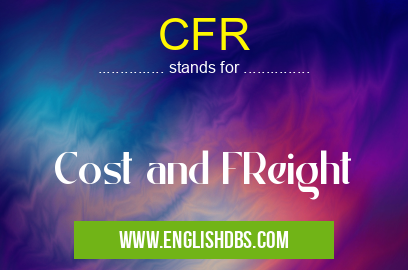What does CFR mean in INTERNATIONAL BUSINESS
The full form of CFR is Cost and Freight. It is a type of international trade term that specifies who is responsible for the payment of freight and other related costs for goods being shipped from one point to another. The abbreviation ‘CFR’ stands for Costs and Freight; it defines the cost associated with transporting goods in international trade and who is responsible for them. The price quoted in international trade contracts under the CFR system covers only the cost of delivering goods to their destination port.

CFR meaning in International Business in Business
CFR mostly used in an acronym International Business in Category Business that means Cost and FReight
Shorthand: CFR,
Full Form: Cost and FReight
For more information of "Cost and FReight", see the section below.
What Does CFR Mean?
In business, Cost and Freight (CFR) is a legal term used in international trade agreements that determine who will be responsible for paying certain transport-related costs when shipping items from one country to another. Under a CFR agreement, the seller pays all transportation costs up to the port of destination, but does not include any additional expenses including loading, unloading, or insurance premiums. All these additional expenses must be paid by the buyer upon arrival at the port of destination.
When goods are sold on a CFR basis, it means that both parties carry some risk associated with carrying out their obligations under the contract; if something were to happen to the goods during transit then responsibility would lie solely with the seller until they arrived safely at their designated port. However, if any problems occur after arrival then responsibility shifts over to the purchaser.
Essential Questions and Answers on Cost and FReight in "BUSINESS»INTBUSINESS"
What is Cost and Freight (CFR)?
Cost and Freight (CFR) is international commercial term in which a seller agrees to cover the costs associated with the delivery of goods up to their arrival at a designated port. This includes the cost of preparing the necessary documentation for shipment, as well as the payment of shipping fees on behalf of the buyer.
Who determines the amount of freight costs associated with CFR?
The seller is responsible for determining and paying freight costs for CFR shipments. The amount may vary depending on factors such as volume, type of goods, distance travelled, and mode of transportation.
Does CFR include insurance coverage?
No, insurance coverage must be purchased separately from CFR. The seller is responsible for arranging appropriate coverages prior to shipment if desired by either party. However, basic marine insurance is typically included in any charges related to sea transport.
Are there additional costs associated with CFR shipments?
Yes, other incidental costs may apply depending on specific requirements by either party or applicable laws and regulations. These can include port handling fees, customs duties and taxes, inspection fees, or storage fees while waiting to clear customs or be shipped out from port.
How does CFR benefit buyers?
Using this method allows buyers to save money since they only need to pay for purchasing the goods themselves without worrying about freight charges or insurance fees until they reach their destination port. Additionally, many ports offer competitive rates that are lower than what individual buyers can obtain through other sources.
What exactly does an exporter deliver under a Cost & Freight agreement?
Under C&F agreements, an exporter arranges for delivery and covers all expenses up until they reach their destination port including export clearance documents such as bills of lading or airway bills; packing costs; loading charges; ocean/air freight; fuel surcharges; port handling fees; etc. Delivery at port also includes safekeeping until collection by importers.
Is it possible for specific terms relating to delivery to be amended when using CFR? Possible terms could include transit time or special packaging needs such as temperature-controlled shipments.
Yes – these arrangements can always be negotiated between buyer and sellers prior to shipment taking place. In many cases these requests will result in additional charges given that extra precautions will need to taken during transit however both parties have flexibility when setting terms.
Final Words:
In conclusion, Cost and Freight (CFR) is an important term used in international trading contracts as it determines who will pay for certain transport-related services such as unloading, loading, insurance premiums etc. This helps ensure a fair payment system between both parties involved in an agreement by setting out clear boundaries regarding what each party will take charge of if something were to go wrong during transit or afterwards upon arrival at its designated destination.
CFR also stands for: |
|
| All stands for CFR |
